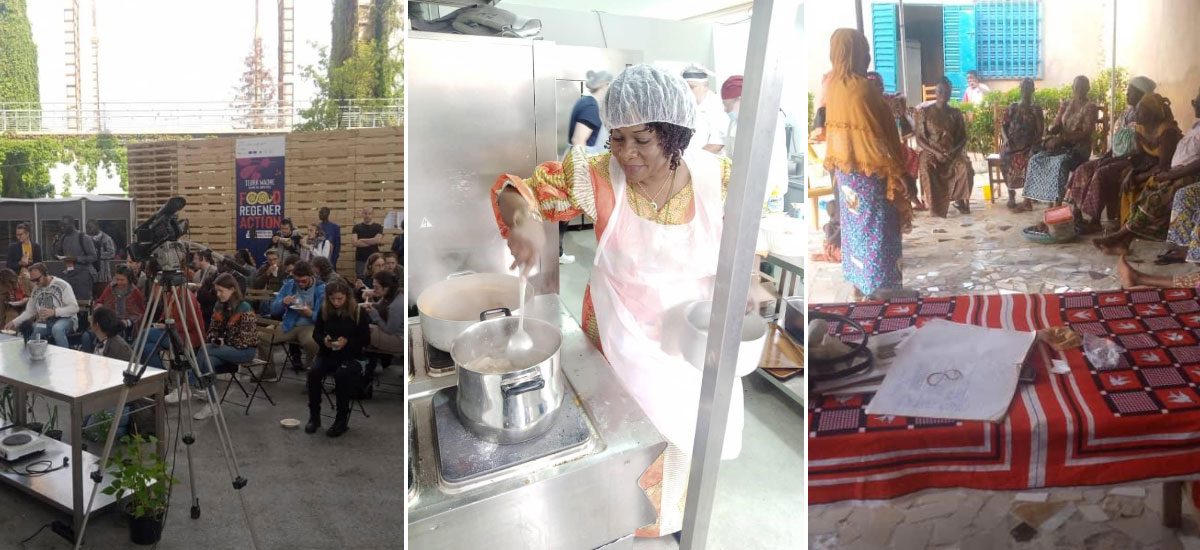“Enabling women to share their experiences to free themselves and find solutions”
Women are key players in peace and development in the Sahel. President of the association “Femmes de l’avenir”, Franceline Tranagda describes how women’s role could be strengthened in Burkina Faso.

What are the actions carried out by the Association femmes de l’Avenir?
The association “Femmes de l’avenir” was created in 1999, is based in Ouagadougou and has about 50 members and an executive board of 15 people.
We created this association with the aim of fighting against women’s poverty. Our association carries out actions to combat violence against women, promote reproductive health, provide schooling for young girls and literacy training for women, and fight against HIV-AIDS. We raise awareness among women and girls about saving through tontine activities and we support them by granting microcredits for income-generating activities. In the self-employment sector, we help women to get working equipment such as looms, to value local food and food processing. In terms of awareness-raising, we work with radio stations to provide information on issues such as excision, forced marriages and the levirate…
Our intention with this association was to bring women together to offer them a framework for exchange allowing them to share experiences and to free themselves. Many women face problems that seem insurmountable and they have no place to confide in. Our association is an opportunity for them to exchange, to talk about their experiences and to find solutions. We also refer them to places for psychosocial care.
Our motto is “One woman, one activity”. As soon as a woman joins the association, we look to see if she is doing something great. We try to support women and girls in their personal development.
Could you present one of the main activities of your association?
We focus on training in the area of food processing and the valorisation of local foods. We are in the process of formalising and setting up a resource restaurant, for example. We want to make it more visible and accessible. We value and produce biscuits made from cereals, local cereals such as white sorghum, red sorghum, maize, maize flour, potato flour, cassava flour, etc.

What are the main problems faced by women and girls in Burkina Faso? How do they deal with these issues?
Despite the efforts of state authorities and organisations, it has to be acknowledged that the situation of girls and women is not entirely satisfactory. They are still confronted with gender-based violence, excision, early and forced marriages, marginalisation due to socio-cultural constraints and lack of access to means of production. The security crisis has aggravated the vulnerable situation of these women and girls; they are more exposed to violence.
Read also
Contribute to the Effectiveness of Women’s and Girls’ Rights
Interview with Christiane Zaï/Nikiema, Association of Legal Expert Women of Burkina Faso
What are the mechanisms for dealing with all these difficulties?
We provide women with food, care, contact with development partners to give them the means to carry out income-generating activities to cope with the problems they face in society in particular.
Women are the pillars of their families. They carry out activities to support heads of households. We can, by strengthening women’s leadership, enable them to defend their rights. Economic empowerment in the judicial system can also help address female poverty. In reality, we see that women fight more than men. We advocate with the authorities for the application of texts and laws in favour of the promotion and protection of women’s and girls’ rights.
How can development partners act to support building a better life for women and girls in Burkina Faso?
Promoting access to equitable education through initiatives and keeping girls in school will enable these girls and women to build a better life. Promote optimal support for young girls and women victims of gender-based violence, which has become recurrent in recent times. The implementation of specialised structures for better care and the provision of subsidies and credits would facilitate the implementation of development projects to improve their living conditions.
What are the strengths and resources that women have to build peace today?
Within the framework of the UN Integrated Strategy for the Sahel, there is the implementation of the women’s peace and security agenda. A total of 15,542 women mediators have been trained to prevent conflict or build peace. Women’s participation in conflict prevention and peace building is also achieved through sensitisation of the security forces.
As peacekeeping evolves, women are increasingly becoming part of the peacekeeping family and making operations more effective. Women participate in activities to promote peace and social cohesion through associations and NGOs.
Women also embody values that are essential for achieving peace, such as courage, self-sacrifice, humility, determination and faith.
What gives you hope for positive change in the lives of women and girls?
Important legal, social, political and economic measures are being taken and implemented to guarantee the protection of girls and women against violence and to ensure the protection of their rights. All these measures give us hope for positive change in the lives of women and girls. The commitment of state authorities to the promotion of women’s and girls’ rights, for example. The implementation of a toll-free number for reporting gender-based violence allows these women to receive support when reporting. This toll-free number allows many women to seek assistance and implement solutions to problems.
What advocacy do you want to do for women and girls in Burkina Faso?
Women remain a crucial actor in the country’s development and in the promotion and maintaining peace. They must be involved in all decision-making spheres of the nation’s life.
I would like to appeal to the authorities and international partners to help women by promoting their rights so that they can express themselves and participate in political decision-making. Women also need support for coaching, grants, micro-credits to realise their dreams and income-generating activities.
Interview by Armel Hien
Go further

